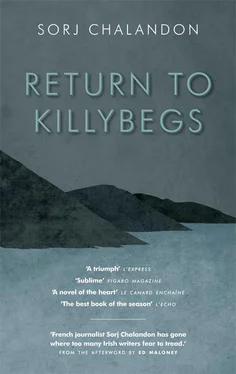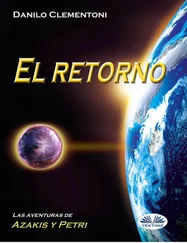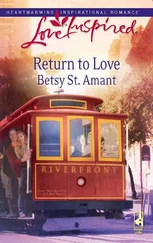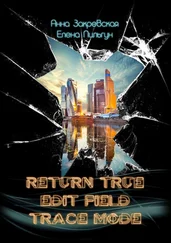That night, Tom Williams came to headquarters to pick out two Fianna.
— Can you whistle, Tyrone?
I told him yes, of course, since forever.
— Whistle.
I brought my two index fingers to my lips.
My father used to love my whistle, my mother hated it. In Killybegs, it was the Meehan gang’s signal for when we came across Timmy Gormley and his lot. Father Donoghue used to say that only the devil’s call could pierce the human ear in that way.
I whistled.
Tom didn’t look surprised. He simply nodded his head.
— In case of danger, I want them to hear you in Dublin.
Daniel whistled without his fingers. He rolled his upper lip and stuck his tongue to his bared teeth.
— Danny and Tyrone, ordered Lieutenant Williams as he headed out the door.
He and I received a dozen pats on the back. The other boys were pleased for us, and proud, too.
In the street, a woman and a girl were waiting for us to come out. I knew the first one, a fighter from Cumann na mBan, the IRA women’s organization. The girl probably belonged to Cumann na gCailíní, the Republican girl scouts. Tom walked in front, we followed in silence. Five shadows on the street.
— Tyrone.
The OC had whispered. Without stopping, he indicated the corner of O’Neill Street and Clonard Street with a jerk of his chin, tossing me a white sliotar edged in black. I caught it in one hand without thinking. A hurling ball signed by the Armagh team. Why? As a front? Of course, no question about it. You had to understand with a glance or stay back at headquarters. I took up my position and threw the sliotar against the wall so it bounced back into my palm. A kid passing the time.
Tom continued on his way.
— Danny.
Daniel Finley took up his position opposite me, on the other side of the road, facing Odessa Street. A bike was waiting for him, turned upside down against the wall, tyres in the air and the chain hanging off. My comrade knelt down, as though fixing it. The young girl went down as far as the corner of the Falls Road with her officer, and they stood there in a porch, like a mother and daughter.
Everything happened too quickly. Daniel was bent over his bike, the streets were empty. Then two cars pulled up. Eight men got out at a run, their arms weighed down. The IRA. Four turned into Odessa Street, the others passed in front of me.
—’Bout ye, Tyrone, a guy whispered to me.
I didn’t recognize him, didn’t even look at him. I was keeping watch over my corner of Ireland, my brick street, my wee soldier’s patch. I only saw the steel of the guns flashing in the light of a window whose curtains hadn’t been properly closed. Guns. Guns from the war. Republican arms. I’d never seen their metal, never imagined the wood of their butts, and there they were by the armload, flying past me within arm’s reach, wrapped in grey blankets.
Doors were opened. Men entered houses, backyards, tiny gardens. The cars left again. Tom came back alone. He passed right beside me. His face, his lowered eyes, his hurried profile. He was whistling ‘God Save Ireland’. He went back up towards Clonard Street. I was almost disappointed. I had imagined a wink or a word. Across the way, Daniel righted the bicycle and headed off as well. It was his eleventh time being a lookout. He knew how these things finished.
— You can call me Danny, Finley threw at me without turning.
So I left my wall. I put the sliotar in my pocket and went back to Dholpur Lane. I was walking differently. I was someone else. I passed a couple, a woman with her child, a young girl who was carrying her gas mask over her shoulder like a stylish bag. They didn’t notice me, even though I was a Fianna now, an Irish warrior. An IRA soldier, almost. In a few days, at seventeen years of age, I would join Tom Williams and the others. I’d be the one on the street, running through the cold night, weighed down for combat. I’d be brushing past an open-mouthed back-up Fianna in short pants. I’d secretly slip him his name. I’d be the one he watched vanish into our obscurity. It would be me, Tyrone Meehan. And I would be whistling ‘God Save Ireland’.

For the time being, though, either sitting on the ground or with my back against the ropes of the boxing ring, I was studying. I had left school to take up Republican education. Teachers used to move from cumann to cumann educating the Fianna. I had everything to learn about our country’s history. All I knew of our struggle was from my father’s stumbling drunken words and gesticulations. Though I knew the major dates and hallowed names, it was without having grasped their significance. My credo was infantile: ‘Brits out!’ I had inherited that certainty from my father, but nothing else.

One particular day, our class was tense and the group was divided. Our teacher was a woman. For an hour she had been explaining that the war currently devastating Europe was no concern of either our party, our army, or our people, but that perhaps we could gain something from it.
On the makeshift board consisting of some slates attached to a wooden surface, she wrote the phrase delivered in 1916 by James Connolly, the Irish trade unionist, soldier and martyr: ‘We serve neither King nor Kaiser but Ireland!’ On that Easter Monday, while the British were fighting alongside the Americans and the French in the trenches of the Somme, and the Northern Irish Protestants who had joined the king’s army en masse were being cut to pieces in their thousands in the front line, the Irish Republicans were rebelling in the very heart of Dublin. A handful of brave men bearing arms. ‘Treason! You’ve stuck a knife in our back!’ the English had howled.
— Treason? But who had we betrayed? What had we betrayed? the teacher asked.
We weren’t allied with the British but occupied by their soldiers, tortured by their police and imprisoned under their laws. So this war was weakening them and making us stronger.
We listened as she recounted the takeover of the GPO by the insurgents, the Declaration of Independence proclaimed outside it, the savage crackdown, the crushing of the Rising and the execution post for each of our leaders, one by one. This bloody failure that wasn’t a failure. This badly doused flame that would set the entire country alight.
We had the right to ask questions, and it was Danny Finley who raised his hand. He suggested that there was a difference between 1916 and 1942, between an imperialist slaughter and a world war, between Kaiser Wilhelm II and Adolf Hitler. He asked whether, along with the whole of Ireland, the IRA should reconsider its neutrality. I remember that moment. There were about twenty of us in the Kane Street headquarters.
— You want to lecture the IRA, Finley? asked another Fianna.
And they all started talking at the same time. Our role was not to criticize but to obey. The Army Council, the Northern Command, Sinn Féin’s Ard Chomhairle, all these men knew what was right for Ireland.
I had taken out Tom’s sliotar and was rolling it between my palms. Danny didn’t back off.
— And what will happen if an IRA combatant kills an American by accident? Can you tell me what would happen then?
— Why would the IRA kill an American?
— Because there are thirty million of them, because they’re everywhere, in cities, in the countryside. Can you imagine it? A Republican combatant mistaking his target? An óglach aiming at an English soldier takes down a Yankee who’s handing out chocolate and biscuits to kids?
Читать дальше













